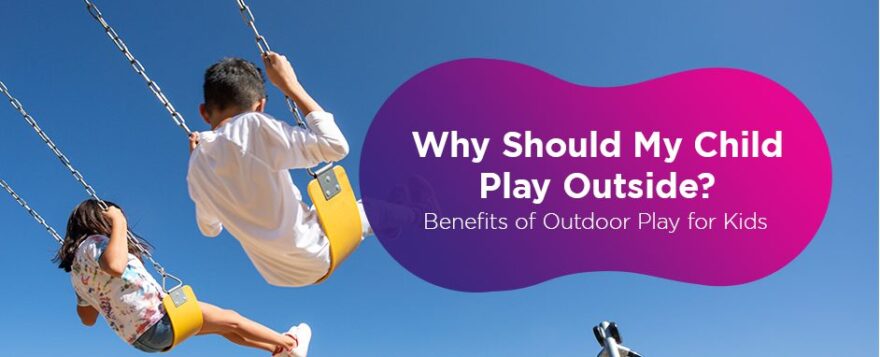Indoor and outdoor play offer unique opportunities for learning in early childhood. Outdoor play provides a variety of sensory experiences that improve cognitive abilities.
Outdoor environments allow kids to be independent, making them feel safe to explore their limits and push themselves further. It also helps them discover their relationship with the natural world.
1. Physical Activity
Physical activity is important for young children and supports healthy growth and development. It strengthens muscles, helps maintain a healthy weight and improves bone health.2,3 Outdoor play also provides the opportunity for children to explore different environments and activities, which allows them to challenge themselves physically.
Young kids need to play in open spaces where they can run and jump and explore their surroundings without feeling intimidated or overwhelmed by other children. Outdoor play also gives children the chance to create positive memories and make connections to the natural environment at a very early age.
For infants who are not yet mobile, this means plenty of interactive floor-based play and tummy time (in order to strengthen the muscles that will be needed for crawling). Once they become more mobile, it will mean exploring the outdoors in a variety of ways such as walking, running and climbing on playground equipment or nature-based structures. Throughout these activities, they will learn a variety of skills including balance and coordination. They will also benefit from exposure to sun and other natural elements which can support immune system function.
2. Social Interaction
Even young infants and toddlers reap the cognitive benefits of interacting with other children. They’re able to develop strong language skills, creativity and social intelligence in the right play environment.
Outdoor play provides many opportunities for kids to interact with one another in a variety of different situations that can teach them how to be more cooperative, take turns and work together. Kids can also learn how to resolve conflicts in a safe, healthy way and develop the confidence they need to play well with others.
Indoor settings often have more rules and restrictions on movement, noise levels and movement than outdoors, which can be a turnoff for kids who want to explore. Kids who spend time playing outside often feel more at ease because they can move around freely and without as much pressure to interact with other kids. In addition, they can learn about the world and nature by observing their surroundings and interacting with it – for instance, noticing the way flowers smell or how mud feels. They can even practice their science and math skills by observing nature and the physical processes of the outdoors.
3. Sensory Stimulation
During sensory play, kids can explore their environment using all of their senses. This is a great way to support cognitive development, says Young and Messer.
They can learn about color, movement, textures and sound while playing outside or even in the bathtub. “You can fill a tub with sand or water and add a few toys, some different smelling soap, bubbles or even just some household items to make your own sensory experience,” says Young and Messer.
Kids also learn to take positive risks when playing outdoors, developing their self-confidence and independence. These experiences will help them to become more open-minded and compassionate adults in the future.
Kids are able to interact with other children of all ages when they play in unstructured outdoor spaces like playgrounds. They develop social skills and learn how to work together to reach a common goal. Kids can also practice resolving conflicts with their peers as they learn to respect each other’s differences. This helps them to become more aware of other people’s feelings and better understand the need to be inclusive in real life.
4. Creativity
The outdoors provides children with a chance to exercise creativity in new ways. Outdoor play allows them to try things they might not have attempted indoors, like swinging high or rolling down a hill. This type of creative exploration is important to the development of cognitive abilities.
In addition, outdoor play encourages children to explore their environment and understand how they fit into it. This teaches them respect for natural spaces and their ecosystems. It also helps them appreciate the world around them, which lays the foundation for future environmental advocacy.
Unfortunately, many children today spend very little time playing outside. This is partly due to the fact that there are other priorities in their lives that often take precedence over free play, such as homework and school activities. However, educators can maximize energetic play by offering shorter but more frequent outdoor play windows. This way, educators can overcome any concerns about weather conditions and still provide their students with the benefits of outdoor play. Playing indoors can promote creativity as well with activities such as crafts, story time and board games all encouraging inventiveness.
5. Communication Skills
Play is about more than just having fun and releasing energy. It encourages creativity and critical thinking. Activities like arts and crafts, story time and board games ask children to be inventive and solve problems. And they can take these skills outside to expand upon them even further.
Kids need outdoor play to build their sensory awareness, develop balance and coordination skills and learn how to navigate different environments. They can practice their spatial and directional skills by climbing on the playground or using a stick to explore their environment.
The outdoors also provides unique opportunities to help kids develop social and emotional skills with other children. They can practice turn taking, encouragement and empathy during outdoor play. This is important as it lays the foundation for positive classroom relationships that will continue to grow throughout their education.
Young children need challenge and risk within a safe framework to become confident, self-directed learners. The natural outdoor environment allows them to do this while building their resilience. Kids learn to adapt to different environments, push their boundaries (at a comfortable pace) and make healthy decisions about their own health during outdoor play.

